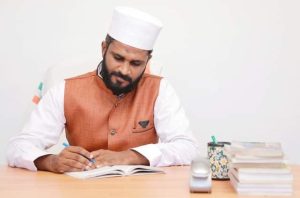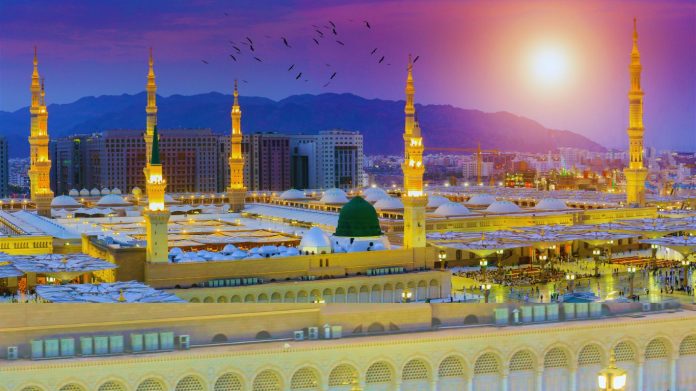
The noble life of Prophet Muhammad ﷺ has illuminated the path of peace and tolerance, paving the way for unity. His teachings are a ray of hope in dark times. In this column entitled “Promoting Tolerance and Unity: Prophet Muhammad’s Insight on Combating Hate,” we explore how his wisdom and path of tolerance can combat hatred in a country like India and promote a more inclusive and peaceful society.

Islam is the world’s first religion that advocates religious tolerance, moderation, and non-violence. It has consistently practiced tolerance not only with Jews and Christians but also with Zoroastrians and polytheists.
The Prophet Muhammad ﷺ abolished all savage warfare methods of the pre-Islamic era and established laws that continue to teach respect for humanity today. According to these laws, during times of war, the killing of women, children, and the elderly, the destruction of places of worship and crops, and the mutilation of enemies, such as cutting off noses and ears, were prohibited.
The Prophet’s ﷺ magnanimity and ability to endure are exemplified in his protection of the holy site of the Jews, Mount Sinai in Egypt, where the Saint Catherine Monastery stands even today. His letter of protection for the monastery and the rights of Christians is preserved in its original form to this day.
In human history, the Conquest of Makkah stands as an unparalleled and unique example of universal values such as humanity, patience, tolerance, and magnanimity. On that day, all the oppressors and pagans of Makkah were humbled, and they trembled in fear, realizing that their fate was in the hands of the Prophet of Mercy ﷺ.
In this situation, the Prophet of Mercy ﷺ asked, “Do you know what I will do with you?” They all replied, “You are a noble brother, and we have hope in your mercy and generosity.” He then said, “Go, you are all free today, no blame will be upon you.”
After the conquest, this conduct is a unique example in human history. The teachings of the Holy Prophet ﷺ are based on the principles of reconciliation and goodwill. Allah, the Lord of all worlds, is the Creator of both humans and human nature. He has chosen the Prophet Muhammad ﷺ as the best gift to humanity.
At this moment, the Islamic Ummah in India is in dire need of the practice of reconciliation because India is currently divided along regional, linguistic, sectarian, and religious lines, and hatred is prevalent. In this context, we must present the example of Islamic tolerance with a call to action, fostering a culture of Islamic tolerance in society, and seeking positive responses rather than reactions.
If we align our attitude and behavior with the example of the Prophet’s life, we can hope that the dawn of this dark night will be bright and illuminating, In Sha Allah.

Tolerance is defined in Islam as a fundamental human principle. It technically means the ability to forgive others, not to respond to an insult with another insult, and to adhere carefully to the high morals advocated by all messengers, prophets, and religions. This promotes goodness in society by fostering solidarity, unity among its members, and the attainment of equality, justice, and freedom through respect for beliefs and different cultures.
Tolerance is considered the soul of democracy. Essentially, it is a human behavior that dictates that even when we disagree with someone’s point of view or opinion, we should exhibit broad-mindedness and open-mindedness by listening to and respecting their perspective. Without such a broad heart, we cannot be considered champions of tolerance, and I believe that no religion in the world fails to impart the lesson of tolerance. Particularly in Islam, this tolerance is elevated to the highest degree. In fact, this tolerance is rooted in religion and is closely related to moral virtues.
“Those who spend in good times and in adversity, and who restrain anger and pardon people, God loves the doers of good.” [Al Imran: 134]
The Prophet ﷺ said: “Maintain ties with those who sever ties with you, give to those who deprive you, and forgive those who wrong you.”
“Whoever kills a person under protection (a covenant), will not smell the fragrance of Paradise” (Narrated by Al-Bukhari).
“Is anyone who wrongs a person under protection (a covenant), diminishes them, burdens them beyond their capacity, or takes something from them without their consent? I am the one who will dispute with them and argue with them on the Day of Resurrection.” (Narrated by Abu Dawood)

The promotion of tolerance and unity, inspired by the teachings of Prophet Muhammad ﷺ, is paramount in fostering harmonious societies. His life exemplified these values in numerous ways.
First, the Prophet ﷺ emphasized the importance of treating all individuals with respect and kindness, regardless of their background. His famous saying, “None of you truly believes until he loves for his brother what he loves for himself,” underscores the essence of empathy and compassion.
Moreover, Prophet Muhammad’s ﷺ practice of forging alliances and treaties with diverse communities showcased his commitment to unity among different faiths and cultures. The Constitution of Madinah, a historic document, laid the foundation for cooperation among various groups.
Additionally, his teachings encouraged dialogue and peaceful resolution of conflicts. He advocated forgiveness over revenge, promoting reconciliation and understanding among individuals and tribes.
In conclusion, Prophet Muhammad’s ﷺ teachings emphasize the values of tolerance, unity, and coexistence. Emulating his example can contribute significantly to building inclusive and harmonious societies where diversity is celebrated, and differences are respected.

Tolerance is said to be a good quality of a man and it is essential to form a society. However, intolerance leads a person, people, or society to the worst disaster. If we look back at history and mythology, we can see a variety of horrible acts of intolerance. On the other hand, tolerant people can live in a society with equality despite their differences in caste, religion, opinion, and practice.
Intolerance and hatred are galloping through Indian society like wildfire. Society should realize the root causes and stand aloof from this evil. Our beloved Prophet Muhammad ﷺ said in one of his Hadith: “A true believer is one with whom others feel secure.” (Al-Bukhari) He ﷺ proved these words with action and was not swift to revenge a wrongdoer. These were some examples of tolerance from the life of the beloved Prophet ﷺ.
The intolerant people should be taught to accept differences in society. Intolerance worries people, society, and the nation as it creates violence among people of different groups. Educated youth can play a vital role in eradicating this social evil.




